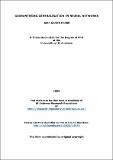Guaranteeing generalisation in neural networks
Abstract
Neural networks need to be able to guarantee their intrinsic generalisation abilities if they are to be used reliably.
Mitchell's concept and version spaces technique is able to guarantee generalisation in the symbolic concept-learning environment in which it is implemented. Generalisation, according to Mitchell, is guaranteed when there is no alternative concept that is consistent with all the examples presented so far, except the current concept, given the bias of the user. A form of bidirectional convergence is used by Mitchell to recognise when the no-alternative situation has been reached.
Mitchell's technique has problems of search and storage feasibility in its symbolic environment. This thesis aims to show that by evolving the technique further in a neural environment, these problems can be overcome.
Firstly, the biasing factors which affect the kind of concept that can be learned are explored in a neural network context. Secondly, approaches for abstracting the underlying features of the symbolic technique that enable recognition of the no-alternative situation are discussed. The discussion generates neural techniques for guaranteeing generalisation and culminates in a neural technique which is able to recognise when the best fit neural weight state has been found for a given set of data and topology.
Type
Thesis, PhD Doctor of Philosophy
Collections
Items in the St Andrews Research Repository are protected by copyright, with all rights reserved, unless otherwise indicated.

